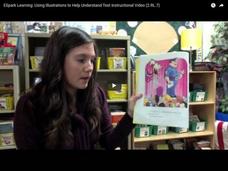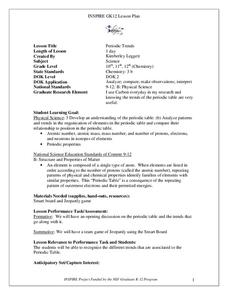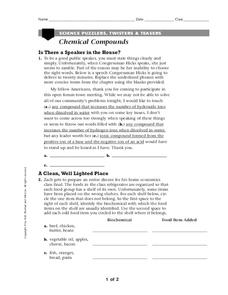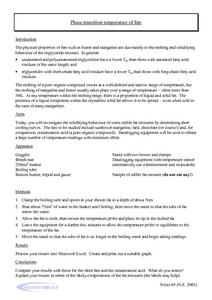Curated OER
Math, Chemistry, and Food
Young scholars explore the effects of chemical reactions when cooking. Using the Internet, they research enzymes and then mix jello. They examine their results and test enzyme activity by adding pineapple to the jello. Finally, they...
National Institute of Open Schooling
Hydrocarbons
The vast majority of hydrocarbons humans use help fuel cars, homes, and provide energy. A comprehensive lesson teaches pupils all about hydrocarbons. From alkanes, alkenes, and alkynes to benzene, classes study the preparation of these...
Science Geek
Equilibrium and Le Chatelier's Principle
Time to shake up the status quo with a presentation that describes Le Chatlier's Principle and has pupils examine situations in which equilibrium is upset. Four examples show different stresses to the reaction and the resulting shift.
Virginia Department of Education
Heat Transfer and Heat Capacity
It's time to increase the heat! Young chemists demonstrate heat transfer and heat capacity in an activity-packed lab, showing the transitions between solid, liquid, and gaseous phases of materials. Individuals plot data as the changes...
Consortium for Ocean Science Exploration and Engagement (COSEE)
Carbon Dioxide & Krill: Impacts
What effects do temperature and carbon dioxide levels have on the zooplankton of Antarctica? This concluding lesson plan in a short unit on climate change and the ocean helps environmental scientists answer these questions. After...
Baylor College
Neural Network Signals
Using a simple circuit with the battery representing the brain, future physiologists test to see which solutions conduct electrical "nerve impulses." Enlighten learners with plentiful information on electric signals in the nervous system...
Consortium for Ocean Science Exploration and Engagement (COSEE)
Ocean Acidification: Whats and Hows
Open this activity by demonstrating the production of acidic carbon dioxide gas by activated yeast. Emerging ecologists then experiment with seashells to discover the effect of ocean acidification on shelled marine organisms. They...
Museum of Science
goREACT
Beginning Boyles and curious Curies can safely experiment with the virtual mixing of elements using this entertaining application.
Curated OER
The Anxiety Workbook For Teens
Teens often face a great deal of worry in their lives, and can be at a loss with how to anticipate and handle their emotions. This workbook is an exceptional resource for both educators and learners alike as a way of supporting teens in...
Curated OER
Periodic Trends
Students identify the different periodic trends. In this chemistry lesson, students discuss how elements are arranged in the periodic table. They apply what they have learned in a Jeopardy team game.
Curated OER
Periodic Table Patterns using Fabulous Periodic
Students explain how elements are arranged in the periodic table. In this chemistry lesson, students group the eggs according to a certain pattern. They compare this to elements in the periodic table.
Curated OER
Ions in the Environment
Students explain the importance of the five main biogeochemical cycles. In this chemistry lesson plan, students discuss how ions are transported in the environment. They design an experiment to collect data on eutrophication.
Curated OER
Calculating the Average Mass of the Newly Discovered Element: Bean
Students determine the average mass of a new element using masses from three isotopes. In this chemistry instructional activity, students explain what an isotope is. They discuss their importance and uses.
Curated OER
Code Makers - Electron Configuration, Aufbau Principle
Learners write the electron configuration of elements using the Aufbau principle. In this chemistry lesson, students build their own key that demonstrates the principle.
Curated OER
Winter
High schoolers explore the nature of water and water molecules. They examine the role of ice on organisms.
Curated OER
Which Sex is It?
Students investigate the structures of flowers. In this determining the sex organs of a flower lesson plan, students dissect flowers with both male and female sex organs and identify each. They also identify the other parts of the flower...
Curated OER
Serial Dilutions Made Easy
Learners improve their skills and comprehend the particular application for which serial dilutions are a tool. Serial dilutions are often used in microbiology, biotechnology, and in chemistry classes, to name just a few.
Curated OER
Life in a Forest Stream
Students assess macro-invertebrates from a stream. In this science lesson plan, students observe, classify and identify organisms found in a stream. A lab station is constructed at the stream sight and students study the different...
Curated OER
Can Acid and Bases Remedy the Body?
Students experiment with acids and bases using technology-based "probe-ware", computers, and household products in this exciting biology/chemistry lesson plan. The lesson plan was written for an advanced 6th grade class.
Curated OER
Chemical Compounds
In this chemistry worksheet, students identify 3 different chemical compounds, 3 identify biochemical products, 4 identify terms, and 2 identify atomic symbols.
Curated OER
Mendeleev's Periodic Table
In this periodic table instructional activity, students learn how Mendeleev organized elements by their atomic weight and grouped elements with the same properties. Students compare Mendeleev's periodic table with the modern periodic...
Curated OER
Urban Life: What Lives In Our Local Park?
Fifth graders participate in activities during a visit to Central Park. In this urban life lesson, 5th graders visit Central Park where they explore pond dipping, stream chemistry, and play a native plant Bingo game.
Curated OER
Classes of Reactions
Show your chemistry class a graphic organizer classifying the types of chemical reactions. A few additional slides are included on the formation of magnesium chloride, the production of methanol, and a diagram of a mixture of molecules....
Curated OER
Phase Transition Temperature of Fats
In this chemistry worksheet, students investigate through experimentation the solidifying behavior of some edible fat mixtures by determining their cooling curves. Then they data-log equipment to obtain a large number of temperature...
Other popular searches
- Organic Chemistry Projects
- Organic Chemistry Activities
- Naming Organic Chemistry
- Organic Chemistry Alcohols
- Organic Chemistry Lab
- Organic Chemistry Model Sets
- Organic Chemistry Quizzes
- Organic Chemistry Detergent
- Simple Organic Chemistry
- Organic Chemistry Reactions
- What Is Organic Chemistry
- Organic Chemistry I

























